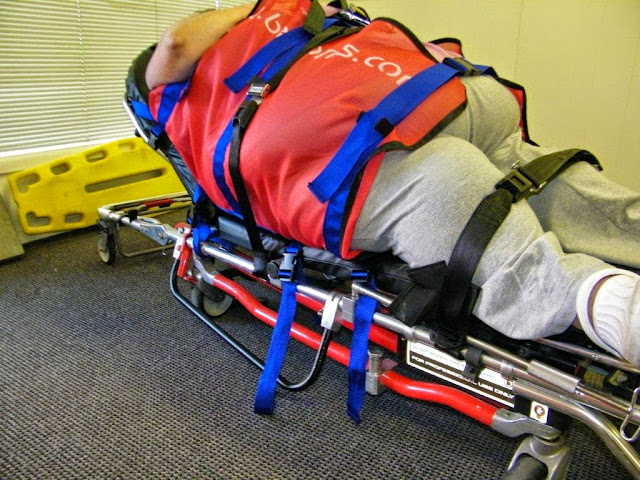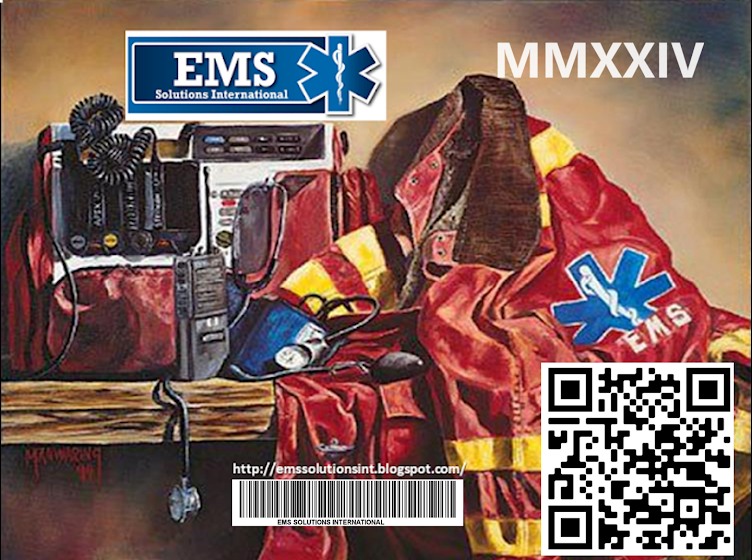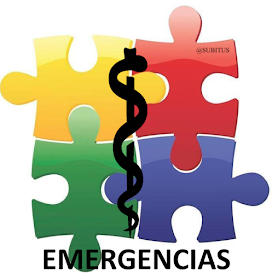 |
| bariatric patient |
Del ingl. bariatric, y este del gr. βαρύς barýs 'pesado' y ἰατρικός iatrikós 'concerniente a la medicina, medicinal, curativo'.
1. adj. Med. Perteneciente o relativo a la bariatría.
https://dle.rae.es/bari%C3%A1trico
Del lat. obesĭtas, -ātis.
1. f. Cualidad de obeso.
| Sin.: |
|
| Ant.: |
|
Sinónimos o afines de obesidad
mórbido, da
- gordura, adiposidad, adiposis, pesadez.
- escualidez, delgadez.
Del lat. morbĭdus, y este der. de morbus 'enfermedad'.
1. adj. Que padece enfermedad o la ocasiona.
| Sin.: |
|
| Ant.: |
|
|
2. adj. Blando, delicado, suave.
| Sin.: |
|
| Ant.: |
|
¿QUÉ ES UNA AMBULANCIA BARIÁTRICA?Ver video
Facebook
Una ambulancia bariátrica es una ambulancia diseñada y equipada para transportar personas con sobrepeso. Este tipo de vehículo puede estar adaptado tanto para la prestación de servicios de transporte sanitario urgente (TSU) como transporte sanitario no urgente (TSNU).
La ambulancia bariátrica, también conocida como UVI Bariátrica, es un vehículo diseñado para el traslado, de manera confortable, de pacientes con un peso superior a los 150 kilos (330 Libras)
CARACTERÍSTICAS DE LA AMBULANCIA BARIÁTRICA
Este tipo de ambulancias son más grandes que las ambulancias habituales y están equipadas con grandes cunas reforzadas con ruedas para pacientes, así como rampas que son capaces de soportar cargas pesadas.
Este tipo de vehículo disponen de un conjunto de camilla eléctrica y raíl móvil con una elevada capacidad de carga igual o superior a los 300 kg, incorporando un sistema de anclaje.
La ambulancia bariátrica no solo protege el bienestar y la dignidad de los pacientes que las necesitan, sino que también protegen a los trabajadores sanitarios, que corren el riesgo de sufrir lesiones al intentar transportar a pacientes con sobrepeso sin los equipos necesarios para ello.
Estos vehículos suelen adoptar la forma de tipo “cajón”. En general, las ambulancias bariátricas resuelven la carga del paciente una vez acomodado en la camilla, hasta el interior de la ambulancia y, en caso de tener mayores dimensiones, permiten una mayor comodidad durante el traslado y facilitan la asistencia en ruta.
¿CUÁNDO SE USAN LAS AMBULANCIAS BARIÁTRICAS?
Como ya hemos comentado, este tipo de vehículo se utiliza para realizar el transporte sanitario a pacientes con un peso superior a los 150kg.
Este tipo de ambulancia se utiliza mucho en países como Estados Unidos o Canadá, donde un porcentaje alto de la población sufre problemas de sobrepeso. En España también están presentes, pero su uso es mucho menos habitual y no está tan extendido como en lo países nombrados anteriormente.
Esta tipología de ambulancia también se emplea para el traslado de recién nacidos (neonatal) que precisen de incubadora y garantizan un trayecto con la máxima seguridad.
FLOTA DE GRUP LA PAU
En Grup La Pau contamos con una ambulancia bariátrica adaptada para el traslado de pacientes con obesidad mórbida, y está pensada para dar el mayor grado de confort posible a este tipo de personas durante el servicio. Contiene una cama articulada de 2 metros, que para su acceso y salida de la ambulancia dispone de una rampa y un cabestrante con el fin de facilitar y suavizar la subida y bajada del paciente.
Fuente
La ambulancia bariátrica, también conocida como UVI Bariátrica, es un vehículo diseñado para el traslado, de manera confortable, de pacientes con un peso superior a los 150 kilos (330 Libras)
CARACTERÍSTICAS DE LA AMBULANCIA BARIÁTRICA
Este tipo de ambulancias son más grandes que las ambulancias habituales y están equipadas con grandes cunas reforzadas con ruedas para pacientes, así como rampas que son capaces de soportar cargas pesadas.
Este tipo de vehículo disponen de un conjunto de camilla eléctrica y raíl móvil con una elevada capacidad de carga igual o superior a los 300 kg, incorporando un sistema de anclaje.
La ambulancia bariátrica no solo protege el bienestar y la dignidad de los pacientes que las necesitan, sino que también protegen a los trabajadores sanitarios, que corren el riesgo de sufrir lesiones al intentar transportar a pacientes con sobrepeso sin los equipos necesarios para ello.
Estos vehículos suelen adoptar la forma de tipo “cajón”. En general, las ambulancias bariátricas resuelven la carga del paciente una vez acomodado en la camilla, hasta el interior de la ambulancia y, en caso de tener mayores dimensiones, permiten una mayor comodidad durante el traslado y facilitan la asistencia en ruta.
¿CUÁNDO SE USAN LAS AMBULANCIAS BARIÁTRICAS?
Como ya hemos comentado, este tipo de vehículo se utiliza para realizar el transporte sanitario a pacientes con un peso superior a los 150kg.
Este tipo de ambulancia se utiliza mucho en países como Estados Unidos o Canadá, donde un porcentaje alto de la población sufre problemas de sobrepeso. En España también están presentes, pero su uso es mucho menos habitual y no está tan extendido como en lo países nombrados anteriormente.
Esta tipología de ambulancia también se emplea para el traslado de recién nacidos (neonatal) que precisen de incubadora y garantizan un trayecto con la máxima seguridad.
FLOTA DE GRUP LA PAU
En Grup La Pau contamos con una ambulancia bariátrica adaptada para el traslado de pacientes con obesidad mórbida, y está pensada para dar el mayor grado de confort posible a este tipo de personas durante el servicio. Contiene una cama articulada de 2 metros, que para su acceso y salida de la ambulancia dispone de una rampa y un cabestrante con el fin de facilitar y suavizar la subida y bajada del paciente.
Fuente
¿Qué es una camilla bariátrica de ambulancia?
25 de agosto de 2022
KARTSANA Camilla Bariátrica
Una camilla bariátrica permite el transporte de pacientes voluminosos en ambulancias y hospitales. Son camillas adaptadas y diseñadas para soportar 300 Kg de peso. Su nombre proviene del término bariatría, siendo su raíz del griego “bari” que significa “peso”.
Actualmente las camillas bariátricas de ambulancias son eléctricas en su mayoría, permitiendo al Técnico de Emergencia Sanitario subir y mover la camilla sin esfuerzos ni riesgos de sufrir lesiones transportando un paciente con sobrepeso. Asimismo, la camilla va acompañada de un raíl telescópico capaz de soportar la misma capacidad de carga, el cual va anclado en la ambulancia, adaptada también para tal fin.
Traslados de especial cuidado
Los pacientes con mayor volumen y peso o pacientes bariátricos requieren una atención especial, es importante garantizar la seguridad y la estabilidad en el traslado a la vez que su comodidad.
La camilla bariátrica puede ser una única unidad o se puede optar por adaptar un accesorio de ensanchamiento sobre camillas que soporten los 300 Kg. Las camillas bariátricas ocupan más espacio dentro de la ambulancia, por lo tanto, esta última opción resulta más flexible, ya que la camilla se puede utilizar tanto en su versión estándar como bariátrica.
La camilla bariátrica de KARTSANA
KARTSANA dispone de dos tipos de accesorios o kit bariátricos para sus camillas:
El kit bariátrico
Es un accesorio de ensanchamiento lateral que consta de un sistema que permite la instalación instantánea, anclando los ejes del kit en pestillos preinstalados en la camilla. Cuenta con 2 versiones para la camilla POWER BRAVA TG-1000 y para la serie Júpiter TG-880C2 y C4.
Kit bariátrico
Consiste en un accesorio de ensanchamiento que se coloca en la superficie del paciente mediante un sistema de guías a encajar en posicionadores que aseguran la instalación. Al igual que el sistema CLICK, este kit bariátrico tiene opciones para las camillas POWER BRAVA TG-1000 y para Júpiter TG-880C2 y C4.
obesidad Accesorio de ensanchamiento de la superficie del paciente para transporte de pacientes voluminosos. El sistema permite la instalación en 6 minutos, es plegable y se suministra con los cinturones, colchones laterales y una cómoda bolsa de transporte.
25 de agosto de 2022
KARTSANA Camilla Bariátrica
Una camilla bariátrica permite el transporte de pacientes voluminosos en ambulancias y hospitales. Son camillas adaptadas y diseñadas para soportar 300 Kg de peso. Su nombre proviene del término bariatría, siendo su raíz del griego “bari” que significa “peso”.
Actualmente las camillas bariátricas de ambulancias son eléctricas en su mayoría, permitiendo al Técnico de Emergencia Sanitario subir y mover la camilla sin esfuerzos ni riesgos de sufrir lesiones transportando un paciente con sobrepeso. Asimismo, la camilla va acompañada de un raíl telescópico capaz de soportar la misma capacidad de carga, el cual va anclado en la ambulancia, adaptada también para tal fin.
Traslados de especial cuidado
Los pacientes con mayor volumen y peso o pacientes bariátricos requieren una atención especial, es importante garantizar la seguridad y la estabilidad en el traslado a la vez que su comodidad.
La camilla bariátrica puede ser una única unidad o se puede optar por adaptar un accesorio de ensanchamiento sobre camillas que soporten los 300 Kg. Las camillas bariátricas ocupan más espacio dentro de la ambulancia, por lo tanto, esta última opción resulta más flexible, ya que la camilla se puede utilizar tanto en su versión estándar como bariátrica.
La camilla bariátrica de KARTSANA
KARTSANA dispone de dos tipos de accesorios o kit bariátricos para sus camillas:
El kit bariátrico
Es un accesorio de ensanchamiento lateral que consta de un sistema que permite la instalación instantánea, anclando los ejes del kit en pestillos preinstalados en la camilla. Cuenta con 2 versiones para la camilla POWER BRAVA TG-1000 y para la serie Júpiter TG-880C2 y C4.
Kit bariátrico
Consiste en un accesorio de ensanchamiento que se coloca en la superficie del paciente mediante un sistema de guías a encajar en posicionadores que aseguran la instalación. Al igual que el sistema CLICK, este kit bariátrico tiene opciones para las camillas POWER BRAVA TG-1000 y para Júpiter TG-880C2 y C4.
obesidad Accesorio de ensanchamiento de la superficie del paciente para transporte de pacientes voluminosos. El sistema permite la instalación en 6 minutos, es plegable y se suministra con los cinturones, colchones laterales y una cómoda bolsa de transporte.
LEER en el enlace
https://emssolutionsint.blogspot.com/2010/12/obesidad-infantil-un-problema-de.html
Practice professionalism with bariatric patients
As individuals we are entitled to our opinions, but understand the causes of obesity before commenting on it
EMS News in Focus
by Arthur Hsieh
https://emssolutionsint.blogspot.com/2010/12/obesidad-infantil-un-problema-de.html
Practice professionalism with bariatric patients
As individuals we are entitled to our opinions, but understand the causes of obesity before commenting on it
EMS News in Focus
by Arthur Hsieh
Earlier this week, an EMS1 reader reached out to me via email, lamenting about some of the crass comments that were written about obese patients. Indeed, it's pretty interesting how some of our colleagues view obese patients. Fortunately, most of the comments on the thread were in rebuttal to the few crass ones.
Obesity is a major health issue for many in our country. According to the Centers for Disease Control nearly 36 percent of the U.S. population is obese, which is defined as having a body mass index (BMI) of 30 or more, and 6.3 percent are morbidly obese (having a BMI of 40 or more). The health issues associated with being very overweight are significant, and are a factor in the patient population EMS serves.
The reasons for being obese are many. Medical conditions, the inability to conveniently buy healthy foods, a lifestyle that promotes poor eating habits, and not making exercise a priority all contribute to the issue. Making a deliberate choice to be obese is not a factor.
A video training presentation designed solely for the employees of S.T.A.R. Ambulance Service on the safe and proper transportation of bariatric patients. While the presentation does attempt to best follow the guidelines set forth by the manufacturers, the statements and procedures used in this video have not been approved by nor necessarily represent those of either the Stryker or Tran Safe corporations.












No hay comentarios:
Publicar un comentario